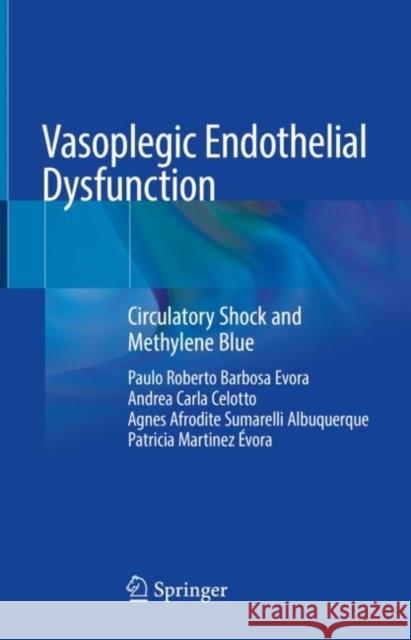Vasoplegic Endothelial Dysfunction: Circulatory Shock and Methylene Blue » książka



Vasoplegic Endothelial Dysfunction: Circulatory Shock and Methylene Blue
ISBN-13: 9783030740955 / Angielski / Twarda / 2021 / 144 str.
Vasoplegic Endothelial Dysfunction: Circulatory Shock and Methylene Blue
ISBN-13: 9783030740955 / Angielski / Twarda / 2021 / 144 str.
(netto: 499,55 VAT: 5%)
Najniższa cena z 30 dni: 501,19
ok. 16-18 dni roboczych.
Darmowa dostawa!
“Clinical and basic scientists … are an appropriate audience. … This is a welcome review of mechanisms of circulatory collapse in a variety of shock states.” (David James Dries, Doody's Book Reviews, September 10, 2021)
1. Physiology of the Endothelium
2. Circulatory Shock: A Conceptual and Practical Approach
3. Circulatory Shock, Ischemia Reperfusion Injury, Inflammatory Response Syndrome (SIRS) and Multiple Organ Failure
4. Endothelial Dysfunction in Hemorrhagic Shock
5. Endothelial Dysfunction in Cardiogenic Shock
6. Endothelial Dysfunction in Distributive Shock
7. The Inhibition of Guanylate Cyclase by Methylene Blue as Therapeutic Proposal for Vasoplegia Associated with Shock
8. Methylene Blue
9. Vasoplegic Syndrome in Cardiac Surgery
10. Methylene Blue in the Treatment of Anaphylaxis
11. Acid-Base Balance
12. Cardiac Arrest and Neuroprotection by Methylene Blue
13. Vasoplegic Endothelial Dysfunction in Orthotopic Liver Transplantation
14. Methylene Blue in Children and Neonates
15. Methylene Blue and Burns
16. Methylene Blue and Endocarditis
17. The Therapeutic Use of Inhaled Nitric Oxide
Paulo Roberto Barbosa Evora
Graduated in Medicine from the Ribeirão Preto School of Medicine, University of São Paulo – USP (1972). At the same institution, he completed residencies in General Surgery (1973) and Thoracic and Cardiovascular Surgery (1974), and a PhD also in General Surgery (1980). Dr. Evora was Coordinator of the Endothelial Function Laboratory of the Experimental Surgery Division and Collaborating Researcher in Cardiovascular Surgical Research at the Mayo Clinic, Rochester, MN, USA. Associate Professor (1994) and Full Professor (2004) of the Department of Surgery, Orthopedics and Traumatology at the Ribeirão Preto School of Medicine, USP (1993), clinical director of the Intensive Care Center at the Hospital das Clínicas of the Ribeirão Preto School of Medicine - USP, Coordinator of the postgraduate program (2004-2006), Vice-Head of the Department (2004-2006), Head of the Department (2007-2008), member of the Research Committee of the Ribeirão Preto School of Medicine, and member of the Bioterio Central Commission of the USP Ribeirão Preto Campus, and Editor-in-chief of the Brazilian Journal of Cardiovascular Surgery.
Andrea Carla Celotto
Graduated in Biomedicine from the University of Franca (2002), obtained a Master’s degree in Pharmaceutical Sciences from the Faculty of Pharmaceutical Sciences of Ribeirão Preto, University of São Paulo - USP (2005), and completed a PhD in Sciences at the Ribeirão Preto School of Medicine - USP (2009). She also completed a PhD internship at the Vascular Biology Laboratory at Mayo Clinic, Rochester, MN, USA and a post-doctorate at the Endothelial Function Laboratory of the Department of Surgery and Anatomy at Ribeirão Preto School of Medicine - USP (2013). Former professor at the University of Franca, Dr. Celotto is currently a professor of the Faculty of Health Sciences of Barretos Dr. Paulo Prata and an Associate Researcher of the Department of Surgery and Anatomy, Ribeirão Preto School of Medicine – USP. She has extensive experience in Physiology, Pathophysiology and Pharmacology.
Agnes Afrodite Sumarelli Albuquerque
Bachelor’s degree in Biological Sciences from Universidade Estadual Paulista Júlio de Mesquita Filho, Jaboticabal campus (2005) and specialization in Genetic Engineering and Molecular Biology (2009). She obtained a Master’s degree (2012) and completed a PhD (2018) in Morphology and Experimental Medicine Surgical Clinic. Laboratory Technician at the Department of Surgery and Anatomy of the Ribeirão Preto Medical School of the University of São Paulo.
Patricia Martinez Évora
Graduated in Veterinary Medicine from the Universidade Estadual Paulista Júlio de Mesquita Filho, Jaboticabal campus (2008). Completed internships at Ohio State University, Columbus, OH, USA, in the fields of equine medical clinic and Molecular Biology (2008). She obtained a Master's degree in Veterinary Medicine (2012) and completed a PhD in Animal Pathology from the Universidade Estadual Paulista Júlio de Mesquita Filho, Jaboticabal campus (2017). Dr. Évora is currently a postdoctoral fellow in Immunoparasitology at the Ribeirão Preto School of Medicine - USP.
This unique work presents one of the most significant organ failure condition – cardiocirculatory shock – and the prominent role of Methylene Blue (MB). Through their extensive experience, the authors’ consider that the lifesaving feature of MB is still underestimated. For this reason they outline key concepts of MB, mentioning essential experimental data, yet focusing mainly on its application in the care of critically ill patients.
In an easy-to-read format, the 18 chapters were organized in a didactically structured order, distributed in four parts. The first part introduces the general conceptual aspects and physiology of the endothelium. The second part presents the particularities of endothelial dysfunction in different types of shock. Methylene blue is discussed in detail in the third part. In the fourth part, particular situations of endothelial dysfunction, such as heart surgery and organ transplantation, are described. Additionally, the two complementary subjects of acid-base balance and the therapeutic use of inhaled nitric oxide are mentioned.
Finally, looking for therapeutic alternatives for what we classify as "vasoplegic endothelial dysfunction", MB remains promising as an adjuvant to sympathomimetic amines. The combination of three recently proposed concepts may be useful in obtaining better results against the high mortality rates in critically ill patients. These three concepts are "wide-spectrum vasopressors", vasopressor economy strategies, and microcirculation protection against the harmful effects of using high concentrations of amines.
This book´s translational approach will appeal to a variety of readers within the health specialties of medicine, biomedicine, physiotherapy, nursing, odontology, and basic science.
1997-2026 DolnySlask.com Agencja Internetowa
KrainaKsiazek.PL - Księgarnia Internetowa









